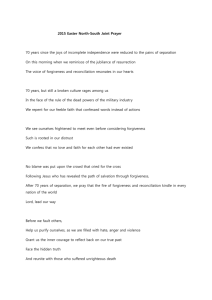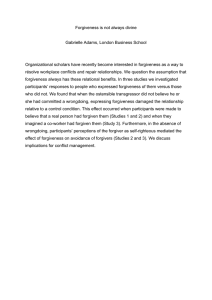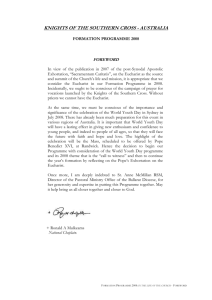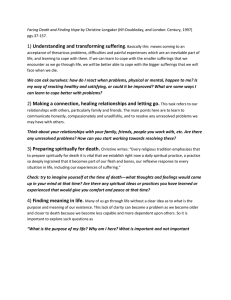The scripture makes it very clear that what humans do... people. Consider some of the standard Advent texts from Isaiah,...
advertisement
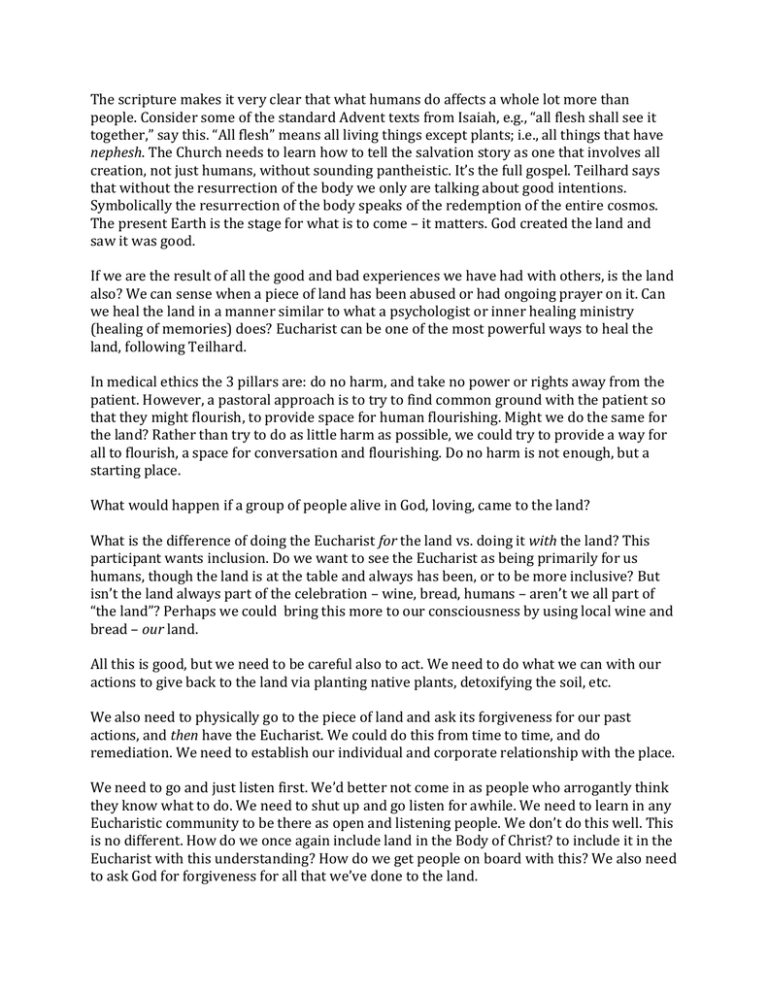
The scripture makes it very clear that what humans do affects a whole lot more than people. Consider some of the standard Advent texts from Isaiah, e.g., “all flesh shall see it together,” say this. “All flesh” means all living things except plants; i.e., all things that have nephesh. The Church needs to learn how to tell the salvation story as one that involves all creation, not just humans, without sounding pantheistic. It’s the full gospel. Teilhard says that without the resurrection of the body we only are talking about good intentions. Symbolically the resurrection of the body speaks of the redemption of the entire cosmos. The present Earth is the stage for what is to come – it matters. God created the land and saw it was good. If we are the result of all the good and bad experiences we have had with others, is the land also? We can sense when a piece of land has been abused or had ongoing prayer on it. Can we heal the land in a manner similar to what a psychologist or inner healing ministry (healing of memories) does? Eucharist can be one of the most powerful ways to heal the land, following Teilhard. In medical ethics the 3 pillars are: do no harm, and take no power or rights away from the patient. However, a pastoral approach is to try to find common ground with the patient so that they might flourish, to provide space for human flourishing. Might we do the same for the land? Rather than try to do as little harm as possible, we could try to provide a way for all to flourish, a space for conversation and flourishing. Do no harm is not enough, but a starting place. What would happen if a group of people alive in God, loving, came to the land? What is the difference of doing the Eucharist for the land vs. doing it with the land? This participant wants inclusion. Do we want to see the Eucharist as being primarily for us humans, though the land is at the table and always has been, or to be more inclusive? But isn’t the land always part of the celebration – wine, bread, humans – aren’t we all part of “the land”? Perhaps we could bring this more to our consciousness by using local wine and bread – our land. All this is good, but we need to be careful also to act. We need to do what we can with our actions to give back to the land via planting native plants, detoxifying the soil, etc. We also need to physically go to the piece of land and ask its forgiveness for our past actions, and then have the Eucharist. We could do this from time to time, and do remediation. We need to establish our individual and corporate relationship with the place. We need to go and just listen first. We’d better not come in as people who arrogantly think they know what to do. We need to shut up and go listen for awhile. We need to learn in any Eucharistic community to be there as open and listening people. We don’t do this well. This is no different. How do we once again include land in the Body of Christ? to include it in the Eucharist with this understanding? How do we get people on board with this? We also need to ask God for forgiveness for all that we’ve done to the land. This is a key question throughout the forums – do we need to ask the land for forgiveness or God for forgiveness for what we have done to the land? The Lord’s Prayer – if I have wronged you, I also have wronged God. It’s very Jewish to first have to ask forgiveness of those we’ve wronged and then ask forgiveness of God. That’s what we are told to do. But all of creation is broken. Humans aren’t the only ones who do wrong, who hurt others. How do we deal with that? What resources does the Jewish tradition offer along these lines? Tikkun is one such – “repairing the earth” – it generally has been used for social justice but now also includes the environment. David Haskell would be a good one for what it’s like just to sit and listen. Perhaps he could come sometime to talk with us. The group established a subgroup to work on a liturgy of healing to be implemented on a site we would select. This would be a first step, hopefully not a one-time thing.
